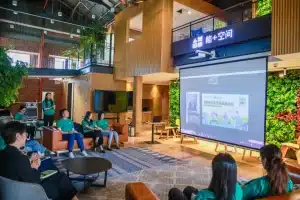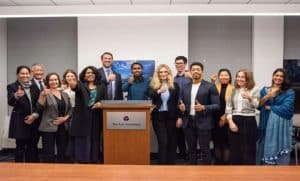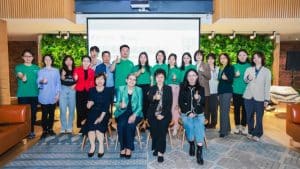In response to the pressing need for collaboration and a sustainable future between the world’s two largest greenhouse gas emitters, China and the United States, the 2030 Climate Champions: Young Leaders for a Brighter U.S.-China Futurewas launched in 2023. With support from the U.S. Mission to China, The Asia Foundation has partnered with the China Association for NGO Cooperation (CANGO) to jointly coordinate this effort.
In November 2023, the program recruited 10 fellows, five from China and five from U.S., and supported these young leaders to exchange insights, develop their communication skills and jointly identify opportunities for mitigation efforts and actions. Over the past four months, the cohort has been deeply engaged in a series of virtual skill-building sessions covering topics ranging from climate change policies to green innovation practices. These sessions have provided access to experts and accommodating channels for the cohort to communicate and collaborate with each other, fostering insights and cross-cultural understanding on climate change among young practitioners in the Asia-Pacific region through hybrid webinars and social media platforms.
The recent two-day 2030 Climate Champions Forum, conducted on April 15th and 16th, 2024, San Francisco Time, and April 16th and 17th, 2024, Beijing Time, symbolized a significant milestone in the program’s journey. Held concurrently in Beijing, China, and San Francisco, United States, the forum convened around 70 young participants from both nations for two half-day joint sessions: Climate Champions’ Insights and Climate Champions and Experts Exchange.

Empowering Voices: Climate Champions’ Insights
During the Climate Champions’ Insights session on April 15th Pacific Daylight Time (PDT)/April 16th China Standard Time (CST), the cohort delivered their collaborated insights in groups ranging from the Track II dialogues, green infrastructure initiatives, and the future potential of electric vehicles and renewable energy infrastructure.
During the first session, Du Yusi from CGTN discussed Track 2 dialogues, emphasizing informal exchanges among experts and scholars. Madeline Craig-Scheckman, a researcher from Northeastern University, stressed effective communication and cooperation between China and the U.S. on climate mitigation efforts. Swathi Manchikanti, of UNICEF, proposed educational programs and green infrastructure exchanges between the two nations.
During the second session, Zhai Yubo, GM of Sustainable Development at Energy Chain Group, discussed electric vehicle trends in China and the U.S., highlighting differing business models and technical standards. Daniel McDermott, an environmental consultant, stressed the need for a diverse array of sustainable energy sources. Yu Qi, from Sany Charity Foundation, discussed various renewable energy infrastructure challenges.
Then, Nkosi Muse, a doctoral candidate in environmental science at the University of Miami, and Ruby Zhang, a young leader focused on climate change education, highlighted that both China and the United States are the world’s largest carbon dioxide emitters. They emphasized the necessity of collaborative action for a healthier, greener planet for future generations.
During the final session, Azmal Hossan, an interdisciplinary researcher, stressed integrating traditional ecological knowledge into climate change strategies, especially in vulnerable indigenous communities. Luo Yi, founder of the social enterprise LAOTU advocating for climate change education and environmental protection, highlighted China’s focus on eco-friendly construction and rural revitalization, while calling for global cooperation in ecological initiatives.
Charting a Sustainable Future: Climate Champions and Experts Exchange
During the second joint session on April 16th PDT/April 17th CST, we welcomed Chinese and U.S. experts in the industry to share their views and insights on the potential opportunities in the global climate governance and green innovation. Chai Qimin, from the National Center for Climate Change Strategy & International Cooperation (NCSC), emphasized the complexity of global climate governance and the need for comprehensive approaches to address climate change. Ge Yong, founder of the “Green Entrepreneurship Hub,” discussed the importance of understanding policies for young entrepreneurs in the green industry. He emphasized that environment protection, low-carbon, and green industries are driven by policies, presenting significant growth potential for green business and solutions. Jessica Gordon, Senior Climate Policy Fellow from California-China Climate Institute, shared the exchange activities the institute has initiated and participated in with its Chinese counterpart over the past few years. She presented observations and recommendations drawn from these exchanges.
After the expert’s engagement session, the fellows had an interactive discussion with the experts, delving into the high-level strategies on climate change in both countries, and both the challenges and practical approaches for young people to engage into climate action.


Looking Ahead: A Call to Action
The 2030 Climate Champions Joint Forum concluded successfully with an exchange of ideas and interactive sharing between young people, experts and scholars from China and the United States. The forum aimed to inspire all young people to unite in addressing climate change challenges, highlighting the commitment, dedication, friendship, and cooperation demonstrated by youth leaders as the start of a new journey. Looking ahead, The Asia Foundation, in collaboration with its peers and local partners, intends continue fostering youth exploration of climate change solutions and green innovation practices through various projects and initiatives, encouraging more young people to actively engage in climate action.



